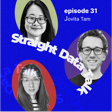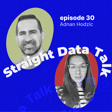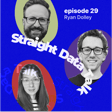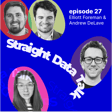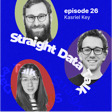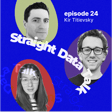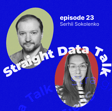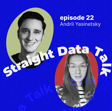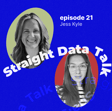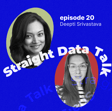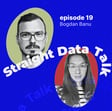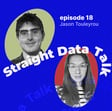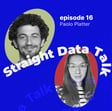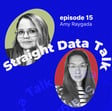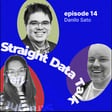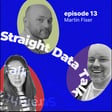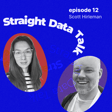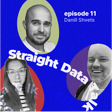Introductions and Backgrounds
00:00:00
Speaker
Hi everyone, it's Yulia Ndamke from Straight Data Talk and we are back today with Patrick from Clarify. Patrick, why don't you jump in, um introduce yourself, tell a bit about your experience and what is seeing interesting you're doing today.
00:00:19
Speaker
Sounds good and appreciate you having me on the podcast. And for everyone who don't know me, my name is Patrick, one of the co-founders of Clarify. I'm based in Seattle. We're an early stage startup, but previous to Clarify, I worked on a company called Iterably, which was very much in the data space. That company got acquired by Amplitude. And before that worked at a variety of different startups. I have two kids, a boy and a girl and a golden retriever.
00:00:45
Speaker
Thanks so much. Yeah, so happy to have you on,
Journey from Iterably to Clarify
00:00:48
Speaker
Patrick. um So what's interesting is that we first met when you were actually developing your product for for it iteratively. And what I think is interesting is that so iteratively for people who don't know it um was a ah tool basically to support the product.
00:01:08
Speaker
The people who run like web tracking, app tracking, that kind of thing um um to kind of ensure schema enforcement and and data quality of your ah your digital analytics, basically. And so now um you've moved on to like the CRM space with with Clarify.
00:01:29
Speaker
um where I see like a similar kind of pattern of really focusing on on the product and and the people and the like real issues and the pains that that people have, um where I think especially in the CRM space, there's also often a data quality issue.
00:01:46
Speaker
and and the other thing that we we hadn't talked about before is that I saw that you're also ah an investor in in Gable, which is like a data contracts company. So I'm starting to see like this trend of data quality in here. And I was just wondering if that is, is that like a common thread in your in your work? Or maybe can you explain like what is the common thread in there?
Data Quality Challenges and CRM
00:02:08
Speaker
Yeah, happy to. And it's actually funny. So back in Atlassian, we actually built kind of a data contracts solution to actually help enforce work across data producers, data consumers.
00:02:19
Speaker
Ended leaving Atlassian, did six months of customer discovery, talked to many organizations and data quality kept on coming up as the number one pain point. We had built an internal solution at Atlassian. And then kind of leaned into that, ended up deciding to go focus on solving that problem for teams. And this wasn't just a problem for data teams. it was a problem for any of the consumers of the data, right? Marketing, growth, BI, you name it We're using this downstream ah and ended up effectively building what became iteratively, which was a data contracts like
00:02:49
Speaker
experience that also did the collection observability around the data and then the federation of the data to a variety different downstream consumers, ah including warehouses and third-body SaaS tools. It was a great experience. A lot of this, again, was really just driven through making sure that we're solving problems for teams and a lot of it was really customer discovery focused.
00:03:09
Speaker
And the intersection, obviously, between data quality for a event collection or analytics is very similar the CRM side. The number one pain point for people with CRM is typically ah the quality is either out of date or just plain bad data.
00:03:25
Speaker
And it's funny because a lot of the pain point with that is required primarily because of manual data entry or just inconsistent integrations with other third party tools, which is very similar to event collection.
00:03:41
Speaker
Um, listen, uh, yeah, that this is so interesting because like today I had a conversation with one large enterprise and they said, they have the problem, of data quality coming from the data sources.
00:03:58
Speaker
But they don't want to enforce it. They don't want to enforce it. They want to receive all the data that is coming in. What they really want to know is what fields and columns have changed.
00:04:11
Speaker
And at this front, I'm like, but this is, the it's basically a change of data sources as a capturing data sources. And um that this sounds like what what you sold it, Iterity?
00:04:27
Speaker
Yeah, iteratively. Sorry. Mouthful, don't worry about it. Gaming's hard. the The question is, were you enforcing it? Because I'm not familiar with the product. Were you enforcing it or you were signaling about the changes? How that was structured?
00:04:45
Speaker
Yeah, so it was twofold, right? When we, we basically built a solution that allowed you to define the schema upfront, and then we would actually generate analytics libraries for instrumentation that would then enforce it on the client.
00:04:56
Speaker
You could say, hey I want to let everything through. And then we would do observability on the data saying, okay, you're, this is the stuff that you're actually collecting. That's not passing validation. This kind of gets into like the, I think Snowplan Analytics is a great solution here for what it's worth.
00:05:09
Speaker
But this gets into like, hey, do you have like a ah clean room that you're putting this data into? Like, are you and you, have like a dead letter queue, right? Which is another way of kind solving that. We can then go backfill the data once you've cleaned it up.
Role of AI and Human Oversight in Data Quality
00:05:20
Speaker
I think the 100% way you're describing is there's really two mindsets. One is like, I want to capture all the data and then I want to make sense of it. Or, hey, I don't want to actually capture the data. I want to do the work up front to make sure that the data I'm capturing is actually correct and useful and valid.
00:05:33
Speaker
And when you think about like GDPR and CCPA and the world of privacy, like I'm more aligned into that camp of like, take the time to instrument, take the time to think about the instrumentation, make sure it's part of your SDLC process versus, hey, like, let me just throw an analytics library, capture all this data and we'll eventually use it.
00:05:49
Speaker
which is kind of the mentality that you had coming from kind of that big data ah view of the early 2010s, being a lot more pragmatic, being a lot more thoughtful upfront means that you're going to drive better outcomes.
00:06:03
Speaker
And this is where you know schema registries or data contract tools really provide value. Yes, like you're always going to have a lineage issue. Yes, things are always going to change. Yes, you're always going to have to update your instrumentation. But it's a lot easier to do that then just and be thoughtful about it than just like assume that you're going to collect data and that people are going to use it.
00:06:23
Speaker
but Because somebody has to sift through the noise at the end of the day. like the The haystack just gets bigger. The needle's the same size.
00:06:31
Speaker
Yeah, so that that's that's really interesting. And I think you're you're pointing out something that that has been on my mind for a long time as well, which is the data collection part, right? And so i think similarly with with Clarify, you're at the front where you're like you're collecting user input as well, right? And it's the same and the same for for the other products that you worked on.
00:06:55
Speaker
So, especially in this sort of age of ai let's sort of say, where where you have these LMs trained on all kinds of data, what do you think the role of enforcing that kind of data quality at the front is? Like, is it are people starting to appreciate it a little bit more? Because, you know, it's always been hard for the people who try to enforce it at the front, and often get downplayed. Do you think that is that pattern is changing?
00:07:25
Speaker
mean, LLNs are amazing. Like, they're very good at classification, summarization, doing a lot of things that typically would have required an analyst or some other data engineering team to go do.
00:07:37
Speaker
The reality at the end of the day is it's like, you still want, like, a person Copilot. Like, you still want a person involved in a lot of this. um And you' spending a lot of time in Amplitude, right? Like...
00:07:49
Speaker
knowing what questions to ask, knowing how to structure the query is half the half the battle. Our NLMs are really good at being like, hey, like tell me about my weekly active of users. Well, what does a weekly active user definition look like?
00:08:02
Speaker
How do you define that? And so it's like it's really good to have some structure and thought process when it comes to like defining metrics or creating consistent metrics across the organization. This is where like metric trees and much of other stuff actually come into account, which is more of lineage problem as well.
00:08:16
Speaker
um But to your earlier point, it's like, is there anything that's changed drastically over the last, you know, it really started in 2019. six years ago, is there anything that's changed drastically in the last six years that would make me challenge my original perspective on this or the things that were we learned.
00:08:35
Speaker
No, I mean, I still think it's worthwhile having a schema, like defining the data that you want to capture. When we think about clarify, right, we focus not just on structured data, relational data, also focus on unstructured data, but we're typically taking unstructured data and then extracting structure from it and putting it into fields, right, in the context of CRM.
00:08:55
Speaker
Additionally, we have time series data. We really are thoughtful about the time series data that we collect and how that powers workflow and automation inside of Clarified. If you had pure just unstructured data and you wanted to build relationships on top of that, it's the question what is that being used for?
00:09:12
Speaker
So it's a margin of error, right? It's a margin of error is 1%. How does that impact your business? If it's 5%, how does that impact your business? If it's 10%, how does that impact your business? And so while AI is fairly good at being able to apply and extract relationships from unstructured data, it's not perfect.
00:09:30
Speaker
And so when you need some level of perfection, right, you want like a human on a loop or you want to be able to enforce it in a schematized way. that is verifiable, right? It's this whole notion of like, is it truthful or not?
00:09:43
Speaker
And um deterministic is is definitely valuable when you're doing things like marketing automation on top of the data, or if you're doing things like best next offer on top of it for e-commerce.
00:09:55
Speaker
um So yeah, it's ah I still think structure is super important and being thoughtful about the data that you collect, how that data is being used and the governance of that data is still just as important, if not more important now that that data is being used by AI as well.
Structuring Data with Clarify's Tools
00:10:11
Speaker
And I think we're still in the world where most people are using AI ah in a co-pilot, not a full autopilot, right? Like AI is not necessarily driving decisions or taking actions on your behalf.
00:10:21
Speaker
But I see that changing pretty drastically actually in the next few years where people will be using it to effectively run big parts of their business. And so again, structure and making sure that you're thinking about the governance of the data that's feeding into these models and how that data is being used and consumed downstream.
00:10:37
Speaker
Probably more important now than actually was six six years ago.
00:10:42
Speaker
and And so what are what are the kinds of problems or challenges that you see for companies that want to have this, um more of this structure? Like, is it, let's say you have a product like Clarify, right?
00:10:56
Speaker
does Does that help them to... structure our data more. I'm assuming they also have like other data sets that they want to pull into that. How do you deal with these kind of legacy systems maybe that you have or other kinds of processes?
00:11:10
Speaker
Yeah. Where, how do you help people to structure their data? Yeah, no, it's a great question. So like, you know, we thought about building Clarify. We still did a bunch of customer discovery for this business to understand what the pain points and challenges that people were having with existing systems of record primarily. And a lot of that was kind of the data sprawl across all these different tools, right?
00:11:28
Speaker
And where are the primitives that these tools had, right? CDPs, when we ended building a CDP essentially, were kind of a bandaid on top of a lot of these is existing products to get the data unified and then activated across these tools.
00:11:42
Speaker
We basically took a counter of position instead of building something that was like more of a layer on top of Salesforce whatever other system record. We actually wanted to build the platform from the ground up to really have the right primitives, the right data model, right flexibility plus control in place as well.
00:11:57
Speaker
So that's what we're doing at Clarify what it's worth. And so we're really thoughtful about what those core primitives are then how people collect and capture the data in a way that's straightforward. structured as well as be able to utilize things like unstructured for more like semantic search and effectively more agentic experiences.
00:12:17
Speaker
um When I think about the companies that we serve today, a lot of the companies that we serve are more earlier-stage startups, right? Seed, Series A, Series B companies. So they don't really have somebody who's thinking about governance per se. They're really just trying work at 1,000 miles per hour.
00:12:32
Speaker
Whereas previously, editor-in-law, were serving publicly traded companies. We had like Canal Plus Box.com, these types of businesses where security, legal, compliance was like a core function of those those companies.
00:12:44
Speaker
Risk mitigation was a core thought process that they had. uh whereas that's not necessarily the case of the teams that we're serving a lot of what they're trying to do is like how do i use new tools to move quicker or get to product market fit quicker or get to revenue quicker as a business um that being said i think the the question that you asked earlier and the way that i probably best articulate it is like we're thinking about all this stuff from the beginning so that companies don't have to run into a case where they have a bunch of data quality issues and So when we think about like how we integrate with these other tools, primarily things like Google Workspace or Outlook or a bunch of the other tools that teams use, we want to make sure that we can collect that accurately and then do better observability and monitoring on top of that data as well.
00:13:25
Speaker
um And this is important because we are customer number one for Clarify. We have the Workspace ID number one. It's like we use this on our on our own. I've dog food every single day. So like it's it's what powers the breadth of our business.
00:13:38
Speaker
um But yeah, it's a governance
Process and People in Data Governance
00:13:41
Speaker
is a challenge. And so it's less of a tools issue. And again, we're talking a little bit about what we're doing to clarify. It's less of a tools issue. it's more of a process of people issue.
00:13:48
Speaker
ah so if you think about people, process and technology, PPT, people in process come before the technology, we're building technology. The thing that always recommend for people is more on education and enablement.
00:13:59
Speaker
So why do you why do you do the things that you do? How do you make it so that people understand, right? Like, hey, governance is important. We don't want to be capturing data that we're not using. It's actually a liability for the company. if we're not using this data and the data is not accurate, it's actually hard to power the things and the decisions that we actually want to make on top of it.
00:14:18
Speaker
And so it really goes into ah education and evangelism as well. And so a lot of what we talked about previously, even in an Amplitude, is like you have to have a champion inside the organization to want be, we call it data-driven, data-informed, however you want to kind of slice that one. um Yeah.
00:14:39
Speaker
I know that's a hot topic for for folks. ah But yeah, you have to have somebody that champions it and cares about it. And one of the things that I've become a little bit more pessimistic about I've gotten older so it really has to be tops down. If the organization doesn't care about it, it's really actually hard to make an impact, bottoms up.
00:14:59
Speaker
And so there are organizations that are very good at using data and worked with many of them. There are organizations that very bad at using data to make decisions and inform strategy. And if you're in an organization like that, it's really hard to evangelize. um You can try and it's like you might make you might make an impact.
00:15:16
Speaker
ah But yeah, that's ah it's that's maybe a different topic. I got a question, um and it might be a little bit um controversial, but listen, Patrick, you just mentioned that we, in a few years, optimistically, we're going to move from this copilot mode with AI, and there is going to be more agentic capabilities, is which which i I totally understand.
00:15:45
Speaker
And more to that, LLMs and agents are just so good at this understanding this and structural data and building relationships and finding insights.
00:15:59
Speaker
It's one of the things that you know Google Cloud promotes a lot. You just get the Gemini and it gets you all the insights about your data set, whatever. So why do you insist or suggest that we need to structure it and put all the, yeah you know, guardrails right now, not guardrails, but all the contracts in between to have it structured at the most if LMS can come in and have us
00:16:30
Speaker
you know, explain that or maybe draw more insights because it's still operational data, which is actually a meat of any organization. Like, wait you know, why do we need to be so rigorous about it?
00:16:45
Speaker
mean, I think the easy answer might be because I'm old, I guess. I don't know. i And it might be Bob. As we all, yeah. Yeah, but it's ah it's like one of those things, right, where it's like,
00:17:00
Speaker
you know if you're an athlete, right? Like if you've ever done athletics, if you've ever done, uh, collegially or not, right? If you've ever played athletes, right? Like, Hey, like there's the hard way of doing it, which is like, I work hard. I train, I do other things where like I take performance-changing drugs.
00:17:13
Speaker
It's like, you have an LLM, right? It's probably more of this, but it's like, hey, this stuff is actually still really valuable, right? Just because they're piping easy out to get to some semblance of an answer. But like I throw a bunch of unstructured data into an LLM and I ask a question.
00:17:27
Speaker
It will give me an answer. It's a question like, how accurate is that answer the end of the day? Is it the same answer that I would have gotten if I actually went through the effort of like trying to define a query? Right? Like, and it probably not, to be honest, because it's like... I wouldn't ask LLM the question, how accurate is something?
00:17:45
Speaker
It's not the best question to ask because it's not deterministic. For sure, it's not deterministic, but it's a question of like, ah you don't always need a deterministic answer. And it's a question of how are you using the LLM, right? So if i ask, a but let's just go through a hypothetical here. like And this is more using clickstream or telemetry data.
00:18:04
Speaker
like If I ask a question, what's my, and then I'll go back to this example. If I, and I'll tell you, know there's a difference between AI accuracy and human accuracy. I think a lot of people actually downplay this where humans are actually valuable and they're pretty inaccurate as well.
00:18:18
Speaker
And I'll give you some context. ah So if I ask a question to AI to generate me what a where a cohort analysis or what my weekly active user growth is, and I ask a question to human, is it going to actually go through the same structured reasoning process of getting to the same answer?
00:18:35
Speaker
And like it's gotten really good at reasoning for what it's worth. Right. It has. And so it's scary good. You might still get two different results. Right. And the question is, if you get two different results.
00:18:47
Speaker
The the ah the understanding of how to analyze that and be able to debug it is actually super helpful.
Decision-Making Over Data Quality
00:18:55
Speaker
It's the same thing with engineering or like I've got all the time, but like understanding how code works is way more valuable.
00:19:02
Speaker
when you're vibe coding, then not. If you're like, okay, you never coded, go build a website. and you can You can get something up, but then if like something goes wrong, how do you know what's happening? If you don't know what a for loop is or like any of these things, like it's going to be really hard to deep log and understand what the code is actually doing that AI is writing for you.
00:19:20
Speaker
It's the same thing with analysis or analytics. But I think the meta point of what I'm trying to talk about is that like analytics or clickstream or telemetry data, the same as relational and data, isn't just used for understanding what's going on. It's actually used for driving action.
00:19:34
Speaker
So we talk a lot about system of record to system of action to system of intelligence. and A lot of folks, I think specifically in the data space, think about system of record for intelligence or insight or BI. We'll just put that in that kind of category versus like I come from a world where like I work with a line of business.
00:19:50
Speaker
I work with marketers. I work with sales teams. I work with other folks who are like, I'm trying to change customer behavior. I'm trying to use this data to insight, to to make a change, whether or not it's journey orchestration for marketing, whether or not it's like sales automation for sales teams.
00:20:05
Speaker
um They're trying to do things with the data. And so when you think about AI, it's like AI is actually pretty good actually going and defining a journey defining a sequence, which scary.
00:20:17
Speaker
It's the question of like if you're basing stuff off bad data, right? there's a data collection issue, it's actually AI is actually going be like, yeah, no, I actually reason the right thing based off the data access to you.
00:20:29
Speaker
Maybe it wasn't actually able to understand that the data actually had a bug. And then the customer impact is that they might have got the wrong message at the wrong time with the wrong offer. Right. And this is the hard part where indeterministic, if it's a deterministic system, right, like there's a person who's valuable.
00:20:45
Speaker
Or to be clear, yeah know, every single marketer has sent the wrong email to the wrong customer at the wrong time. At least once AI doing it is very different than a human doing it. Right. Because you can. Go ahead.
00:20:57
Speaker
I think, yes, I agree on that. Like if if the data is, you know, it's the same story. If we have the wrong input, you know, whatever, it's better to to to to make sure it's a correct records.
00:21:14
Speaker
But I'm more about this case of being rigorous about the data we as data we collect and the schema enforcement. Yeah. because Yeah, because because this is a two different schools of sorts.
00:21:27
Speaker
You either collect and allow the ingestion and do not stop the business. business logic or you know do not interrupt the data flow and just keep receiving the data but know about the issues or enforce it and from what i'm hearing from you we need to enforce and i'm like but uh what if we're gonna enforce it and and stop all everything like is it worth it especially there is gonna be a big alarm boom that kind of just you know
00:21:58
Speaker
help us understand everything. But I think there's there's like this third way, right, which I've seen a little bit in in your work, Patrick, which is where um you where you enforce this is is a different thing. So I think, Julia, you're talking about like there's event data coming in, for example, let's say from your website and whatever. Yeah. Then it comes into this collector and you say, hey, this event is wrong because someone pushed like a faulty event tracking mechanism on the website. So now all the events coming in are like failing and they're not actually being collected.
00:22:34
Speaker
but the other thing that you can do is what i thought was like uh really where we're interested they change the game is that you can go into the developer experience um make sure that it's part of let's say your code editor or your ci process and before your code even hits the website and changes something That's where you enforce the the logic. And then what whatever you do afterward, you know, you can keep collecting your events. But if you can get into the workflow of a developer, um you can you can enable a lot more quality there.
00:23:14
Speaker
And I think that's that's really where I think this is is interesting in in terms of, sure, you can you can have these LLMs that build structures on top of unstructured data.
00:23:26
Speaker
um But there is always going to be some kind of, you need your business to be in a certain structure. You need a certain ah fidelity in the decisions that you're making and data that are residing those decisions. The way that it's funny because it's like there's a lot of analytics tools, right? And what we call implicit tracking versus explicit tracking, right? Implicit being like just throw an SDK will capture a bunch of data and you can like watch session replays. You can like build funnel analysis from it, but it's all based off of tying into like effectively the DOM or...
00:24:00
Speaker
path selectors or you do like explicit like hey i'm actually an instrument and i'm an answer instrument explicitly this is going to require engineering resources to do but i hopefully will trust that the implementation has been done better and i can rely on it to be clear analytics is probably one of the things that you know having worked in the space now for so long it's always going to buggy right regardless root request of it's explicit implicit there's always going to be a data bug or data outage or an issue or somebody like instrumented something title case, somebody a snake case and you can't coalesce the data across iOS and your Android team.
00:24:34
Speaker
And like it's it's it' it feels like more like reality than anything else at this point. And this is where we were trying to solve a lot of those acute pain points. you know The best way and the closest to the metal I talk about now is the closest to the source of the data, right the closest to just running queries on your database, the better. right Because it's like there's just less lossiness in all the things that could go wrong because there will be things that go wrong.
00:25:00
Speaker
Right. And so it's not saying that like one is better than the other. It's just being thoughtful about what data we should capture, what metrics matter for the business is actually a very good forcing function for the team.
00:25:11
Speaker
So whether it's not your product team or marketing team or your C-suite working in a company, what does success look like? Well, do you measure success? Where is that data coming from? Who's responsible for collecting that data?
00:25:22
Speaker
How do we actually ensure that that data is accurate? And like asking those questions forces you to think about and get clarity on like, how are you performing as an organization? Not just like, okay, let's go through an analytics thing. We'll like capture the data. We'll like try to analyze the data later. It's, I think a lot of organizations assume that they ask these questions a lot. And then, know, you might have public OKRs that are tied to metrics, but it's like the reality is like, how often are people looking at data? How many queries are they running?
00:25:50
Speaker
How many decisions are impacted by data? And so this is like more of the self introspective analysis that organizations should be doing to understand like, are they actually getting the most from the resources that they have?
00:26:02
Speaker
what I think a lot of people end up doing is either use big data or small data. And I talk about small data being like, could be quality, could be quantity, name It doesn't have to be statistically relevant. But it's like, what data do you use to make decisions? I think most decisions organizations make after having worked at Amplitude for three years and having been in that space, still were like pretty heavily on cut intuition, which we both, I think everyone here knows pretty valuable and it's 100% biased based off your experiences and background.
00:26:28
Speaker
And so like, we talk a lot about, you know, the quality of the data. I like to always refer to like the quality of the decision making. I think that's actually one that's a lot easier to have impact on than the former.
00:26:42
Speaker
And yes, LLMs will lu improve the former. That's really interesting. I like that matter metric, the the quality of decision making. I think that's also, especially in my... My line of work, right? Like we set up a lot of data platforms. We set up data modeling, data warehouses, bi everything around that.
00:27:01
Speaker
And there is such a tendency to get focused on the tool and improving like one, how the one integrates with the other and how to like optimize this specific column in your dataset.
00:27:14
Speaker
But then, like you say, like you're not necessarily optimizing for the quality of your decision making. You're just optimizing. You're adding these random checks to your data. um But you're never going back in and checking like, hey, that model that I made like three, six months ago, has it actually improved the decision making?
00:27:34
Speaker
Has it been queried? Has it been queried? That's a good one. Yeah. Yeah. So we're in the building. yeah. sure ah so Sorry, I just want to make a joke here. Damki, tell you to your clients so they don't worry about the tooling integration.
00:27:50
Speaker
5Tran and Sensus came together, so everything is going to be just smooth. Yes, it's all going to be in one platform to rule them all, yeah. actually do I think there is benefit of of of one platform, generally speaking, with that announcement. But think that it's funny. I think that we ended up building usage reporting to better understand like how data is being used and consumed. right If you look at like the data set of Ampli2, probably the largest one of the largest behavioral data sets that exists.
00:28:18
Speaker
And most of the data is not being queried. And so like a lot of this data that's being captured is not being queried. And then you create a chart. Well, how often is that chart being worked at? Right. And it's a question of like, OK, well, what decisions were informed by somebody looking at that chart? It's really hard hard to tie that back into value selling or value that these teams have.
00:28:36
Speaker
And so when I think about this, if somebody says like, hey, we need more data, I'm like, well, what decision would you make if you had the data? Right. It's like, OK, well, if you assume that if you had this data and you would make this decision based on X and this decision based off Y,
00:28:49
Speaker
okay, well, what's the what's your what's your gut tell you? And like, okay, great, let's go get the data. And then you can watch them because they'll make the decision that actually against what they said previously. Because it's, again, they're like, a lot of people don't want to be proven wrong, right? And a lot of people want their, they're looking to validate their hypothesis, not invalidate their hypothesis.
00:29:10
Speaker
Again, this goes back to you talk about data quality. It's like, okay, well, that's a small factor of it, right? Because I can i can torture data to say whatever I want it to say. yeah Right? And it's very easy to do that based on how you segment and how you slice the data.
00:29:23
Speaker
And so, again, it's like the meta issue here is not technology or even like the data. and like data It's like it's people, right? Right?
00:29:33
Speaker
ah Listen, Patrick, what is actually stood out to me is that you kind of pivoted to very different business from what you were building before.
00:29:44
Speaker
Like you get into the CRM business. I can understand it's kind of a next gig what you do after, you know, spending so much time in product and analytics and everything.
00:29:57
Speaker
But how did like how did you end up in CRMs? Like... Actually, it's funny because like people think about this as is not related, but I definitely think of as pretty related. right like I worked at Alassia on workflow management for a long time, effectively Jera.
00:30:11
Speaker
I was working on the design team leading the design team for Jera software for a couple of years as well. And CRM is very similar. the end of the you have pretty clunky tools that exist in the market that are super painful or a lot of manual data entry.
00:30:24
Speaker
and are not fun to use, right? And we're trying to build a system that is lovable, right? Something that actually inspires folks at the end of the day. But it's really focused on customer data, right? So like analytics, whether or not product analytics or just customer data in general, right? Like clickstream, telemetry data is part of the data set that people are trying to join on revenue data as well as more relational data.
00:30:49
Speaker
right So like all these all this data kind of in my mind should co-exist. right like My revenue data, my behavioral data set, right like what are people actually doing? And that's like super valuable for post-sales as well as like what are people doing that prospects. And this is super valuable for PLG companies or even like understanding like who's going to your marketing website.
00:31:08
Speaker
ah Are they a prospect? And that's like intent to feed into your team to actually go reach out to them. So like all this data set should just, in my mind, exist within the same platform. Effectively, we're building kind of this unified platform for all this customer data, and then we're building these line of business
Transition to a Unified Customer Data Platform
00:31:22
Speaker
So the first line of business tools is CRM, but like that's going to be followed quickly by tools to help enable sales and marketing automation, tools to enable support and success teams. But it is all built on one unified platform that kind of combines all this data in one place.
00:31:40
Speaker
Maybe that's just in my mind. I think these are related. doesn't so I think that's that's really fascinating because it also ties into a question of of data quality and data collection. Right. And so maybe ah going back a little bit to what you said about that, that quality of decision making.
00:31:57
Speaker
One thing i was I was wondering is like, i think a lot of people, let's say you're you're maybe a product owner of a data team or a chief data officer or even like a lead engineer or something, the lead data engineer, and you want to, you see that you're too focused on your just the data, right? But you want to improve that quality of decision making. Like,
00:32:22
Speaker
What would you advise those kinds of people to, what what can they do to change their focus from maybe just the quality of the data or the integrations or the tools to the quality of the processes and the decision making around them?
00:32:39
Speaker
always think about it. So I actually, i think about it as like impact or like if I'm on a data team or from like a data PM, or like how can I have impact on the organization? that I'm in, right? At the end of the day, it's like, this is all around like incentive alignment and it seems super transactional, but it's like, to be successful in your role, what do you have to do?
00:32:57
Speaker
it's like, you have to have impact on the organization. And so it's like, you can do that through struggling to fight the battle this hard fought, which, it could be data quality. It could be like tools and proper instrumentation, you name it. it just be like, where's where's the low hanging crew?
00:33:12
Speaker
And how do i go figure out how to unblock folks to be successful? And so I think the people that are working data who are super impactful find the ways to align to the overall overall organizational goals and go have quick impact.
00:33:29
Speaker
And i think the hard things about data are hard, and they're hard for a reason, which means that they take time. Right. And like, you don't typically have a ton of time to go work on things when you don't have organizational buy-in.
00:33:41
Speaker
Right. Because it's like, this is all like, however you want to slice it, like impact effort, like go work on the things that are going to provide you the most impact for the lowest, lowest amount of effort, a large, A large part of what I've seen successful people do within data teams is they go do contextual inquiry, right? They go talk to people in senior leadership roles at the company. They figure out what's your biggest problem.
00:34:03
Speaker
Great. Let me go run a report for you. Let me go out how to get you ah one step closer to being able to be successful within your role. Right. And so this is not to say it's self-serving. it definitely is self-serving. Right. Like if you want to get promoted, if you want that raise, if you want to do well, it's like go figure out how to make the people above you successful.
00:34:23
Speaker
And it might not be solving the integration and the data challenges. It might be something else that's just a little bit easier sometimes. Right. I know it sounds really bad coming from somebody who works on tools and data, but a lot of what I feel like people who do really well with their organizations, they can really navigate the organizational politics and help other people get successful above them.
00:34:46
Speaker
Yeah. so So I actually had um a colleague of mine said, like, I think that um the data engineers who cannot talk to um to other people, to stakeholders, those are the ones that will be phased out by um by AI, basically, because that's the stuff that can be automated in in a way.
00:35:10
Speaker
But the complexity and where you have, you know, what we call the analytics engineering, which is kind of that translation between data engineering and the business, um When you can actually talk to business stakeholders, understand their processes and kind of translate what needs to be done in in the data world, um those are the people that will that will thrive. Is that kind of what you're saying here as well?
00:35:35
Speaker
it's It's the same for all. So like if you're an internal employee, right, it's like how much do you understand the business and what success looks like and how to actually help achieve that. Right.
00:35:46
Speaker
And like that's all domain context versus like seeing the go to market. Right. Like how well do you understand the customer and the pain points that they're having and actually how to align what you're doing to value. Right. And both of those things are hard to automate with what it's worth.
00:35:59
Speaker
And, um, So like in my mind, if you're an internal, if you're working on the engineering team or if you're an analytics engineer, it's like, again, what does success look like for the organization? Like how do you help achieve it?
Aligning Data with Business Goals
00:36:14
Speaker
black and white thing for me what it's worth. And it's the same thing if you're go-to-market engineer, right? Like we have like go-to-market engineers. It's like the new rave. It was, what was the analytics engineer two years ago? It's like, how do I figure out how to make organization successful on go-to-market side with data plus systems and tools?
00:36:29
Speaker
And um a lot of it's just like driving impact. That's really interesting. I haven't heard that term before, the go-to-market engineer. Gotta keep that in mind. Yeah, it's like kind of a hybrid between like somebody who's really good at data and like tools and systems, but more focused on driving impact within sales and marketing games.
00:36:50
Speaker
So listen, Patrick, it all makes sense to me. And I'm like, you know, this angry person coming in to to just rent.
00:37:05
Speaker
It makes so much sense to, you know, to small organizations or to, you know, startups and agile organization just... i You know, what I said recently, like we're never going to hire marketing person.
00:37:20
Speaker
That is have to be growth person who has, you know, technical abilities to set set up something just to do things. Just not the marketer. No, we're not going to have...
00:37:33
Speaker
But when we're talking to a large enterprise that already so silenced, not even in data, they are silenced, you know, and their responsibilities. Again, talking to someone, they're like, listen, the problem I have,
00:37:48
Speaker
it's upstream team who is causing it. I'm actually responsible for this piece, but can you help me fix them out of my environment? And, you know, the talks I'm having and I'm like, boy, what I can do is come in and and take your hands and shake them all together and say, let's be friends here.
00:38:10
Speaker
You know, but yeah, I mean, like we we can be talking about this news campaign you know startups and how to do business, how to be fast. But how how how about those enterprises? like Some of them, some teams move fast, like you know doing top-notch things, but some of the teams are lagging and they're using things from 1980.
00:38:32
Speaker
I hear these stories all the time.
Enterprise vs. Startup Dynamics
00:38:35
Speaker
all the time Yeah, it's funny. I mean, so before joined last end, I was actually at EMC. So EMC merged with Dell. EMC was a 65,000 person organization, started out as a furniture company and was doing large hardware, like large storage, like Isilon Atmos style hardware, right? Like you can think of it as like the biggest waterfall company that existed because they're shipping, you know, millions of dollars. Yeah.
00:38:58
Speaker
yeah And so like, Superdome started out as a furniture company, right? So like, let's be clear, was a very different type of business. And, you know, became a became a technology company. And a huge company wore, you most the people there, was very East Coast based, wore suits. was like, not my cup of tea at the time, then joined Elastin where I could, you know, they had struggled to get people to wear shoes in the office. People walking around barefoot. It's a very different environment.
00:39:22
Speaker
And Alassane was a digital native business, right? Like very different environment. And having seen the juxtaposition of working at EMC and Alassane is like, yes, it's different, very different to get work done in these two organizations.
00:39:33
Speaker
This would be the same. It's like situational awareness and situational context is so important. If you're working at an EMC, right, it's a lot harder to get stuff done. It's more of a top-down driven culture. Working on Alassane, it's more meritocracy. It's like how quickly can you have impact, right?
00:39:47
Speaker
It's like you're meant to unblock yourself. And um versus like run things up the food chain, which is what the culture was at e EMC, right? You had to get your boss's approval. They had to get their boss's approval. And then it'd come back down to you like two, three weeks later.
00:40:00
Speaker
And, but yeah, it's, you know, for sure. If you're working mostly with companies that are, I'd say in that realm of culture and operations, the advice I'd give would be very different. If you're working more in the digital native businesses, like the last ones in the world, I get that there's not as many of those businesses and there's probably bit a lot more non-digital native businesses out there that you're working with.
00:40:22
Speaker
ah To be clear, I think even in the non-digital native businesses, like the the folks who are coming from Brook and Mortar, like the... non-tech companies, like there are teams within those that operate in this month and mentality, in this way of working.
00:40:38
Speaker
right So not all teams operate that way, for sure, but there are definitely folks who work within those organizations that move quickly, who care about agility, who care about ah having impact.
00:40:49
Speaker
It's just says they're working in a very different environment, which means that, again, not everyone starts their race at the same starting point. And this is the hard thing that I think ah even in interviewing, like I talk to people, of like you're interviewing somebody who's coming from ah Stripe or Alassian or a Dropbox, the way that they work is very different than if you're hiring somebody that came from a different business.
00:41:11
Speaker
they're not starting their race at the same starting line. So it's really around like what was the impact that they had because they probably had to run through way more walls to get stuff done than if they were in this organization. And so, again, it's not to say it's easier it's easy to have an impact in this type of style of business, but you can definitely have an impact.
00:41:31
Speaker
It's just yeah you have to quantify that and probably the amount of effort to have the impact that you're looking for is greater than the amount of effort effort to have an impact at this style of business.
00:41:46
Speaker
It's definitely... more it also could be more rewarding. as Yeah. I mean, you know, when you talk about like, ah burnout, the most burned out I've ever felt, and this is after like starting companies and doing hard things was that trying to have an impact at these types of organizations.
00:42:07
Speaker
It was just hard to get out of bed, right? Because you're like, you you feel like you're just like pushing a bull up the hill sometimes. And you're a black hole of RJ. And just You just like give it all you have and you don't see any change. Right. So it's like it's, um you know, I definitely empathize with people that work in those organizations. Not to say, hey, go join a different company. No, it's like, you know, like you can have an impact. It's just going to be, it might be a harder fought battle.
00:42:31
Speaker
Right. And I don't love using battle metaphors when it comes to work. It's like, hey, we want to enjoy the work we do. We want to like enjoy the people that we work with. We want to ultimately like work as just such a small component of what we like our our life here on this planet.
00:42:46
Speaker
But it is an important part. right And so, again, when I have a conversation on like optimizing for impact, it's really just like do what you can do within the constraints that you have and try to have the most impact that you can have. right But the environment that you're in is going to dictate to some extent. It will drag have some drag effect on on the work that you do.
00:43:08
Speaker
I think that's ah that's a really great point also to run of our conversation. Just, yeah, the awareness that your life is more than work, but work is is nonetheless an important part of it.
00:43:21
Speaker
um Patrick, I want to thank you so much for your for your time today. It was really insightful insightful conversation. um Maybe yeah to run it off, is there, um yes, there's something, like, do some last words for us? Is there a place where people can find you and and follow you online?
00:43:38
Speaker
Yeah, know i'm on I'm on LinkedIn and Twitter, so feel free to reach out to me there. If you ever to email me, my name email is Patrick at clarify.ai. Happy to help with anything. I hope this conversation was impactful and helps incite some change in the way that you operate.
00:43:54
Speaker
Thanks. Thanks. oh You know, Patrick, thank you so much because instead of talking about the data, you know, structs, nested fields, whatever, we were talking about the impact and actual impact of the data, which, you know, and which is super insightful, at least for me.
00:44:15
Speaker
ah Yeah, thank you so much for dedicating your time to talk to us. And yeah, um have a great day ahead. See you all.
00:44:27
Speaker
Thank you. All right. Bye-bye.

